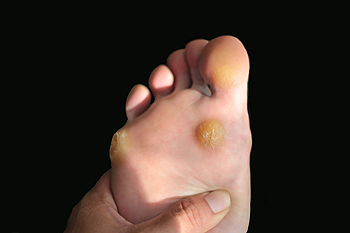 While similar to a callus, corns are harder, smaller, and generally more painful thickened layers of the skin that appear as small lumps on the feet and toes. Typically caused by irritation and friction, corns can be incredibly uncomfortable to deal with if left untreated. To avoid getting a corn, it’s recommended that you wear footwear that gives your toes room to move freely in, you keep your feet clean and moisturized, and you keep your toenails properly trimmed. To help treat corns, it’s often advised that you soak your feet in warm water before filing at it with a pumice stone. Moisturizing after filing and using corn pads may also help to reduce your corn. If your corn is extremely painful, causing swelling, redness, or drainage of pus, we recommend that you consult with a podiatrist as soon as possible for professional care and treatment.
While similar to a callus, corns are harder, smaller, and generally more painful thickened layers of the skin that appear as small lumps on the feet and toes. Typically caused by irritation and friction, corns can be incredibly uncomfortable to deal with if left untreated. To avoid getting a corn, it’s recommended that you wear footwear that gives your toes room to move freely in, you keep your feet clean and moisturized, and you keep your toenails properly trimmed. To help treat corns, it’s often advised that you soak your feet in warm water before filing at it with a pumice stone. Moisturizing after filing and using corn pads may also help to reduce your corn. If your corn is extremely painful, causing swelling, redness, or drainage of pus, we recommend that you consult with a podiatrist as soon as possible for professional care and treatment.
Corns can make walking very painful and should be treated immediately. If you have questions regarding your Feet, contact Brent Harwood, DPM of Southeast Podiatry. Our doctor will treat your foot care needs.
Corns: What Are They? And How Do You Get Rid of Them?
Corns are thickened areas on the skin that can become painful. They are caused by excessive pressure and friction on the skin. Corns press into the deeper layers of the skin and are usually round in shape.
Ways to Prevent Corns
There are many ways to get rid of painful corns such as:
Treating Corns
Although most corns slowly disappear when the friction or pressure stops, this isn’t always the case. Consult with your podiatrist to determine the best treatment option for your case of corns.
If you have any questions please feel free to contact one of our offices located in Fairhope, Brewton, and Atmore, AL . We offer the newest diagnostic and treatment technologies for all your foot care needs.
Read more about Everything You Need to Know About Corns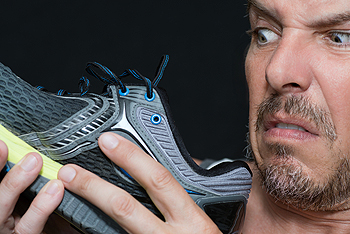 Patients who have excessively sweaty feet may have a condition that is referred to as plantar hyperhidrosis. It may be caused by genetic factors, in addition to extreme emotional or physical stress. This condition may be treated by wearing inner soles that are absorbent, and the feet may feel better while using powders that can absorb the sweat. Additionally, it may help to change socks frequently, which may be beneficial in preventing an infection. If you are suffering from sweaty feet, it is advised that you seek the counsel of a podiatrist who can help you find the right treatment method.
Patients who have excessively sweaty feet may have a condition that is referred to as plantar hyperhidrosis. It may be caused by genetic factors, in addition to extreme emotional or physical stress. This condition may be treated by wearing inner soles that are absorbent, and the feet may feel better while using powders that can absorb the sweat. Additionally, it may help to change socks frequently, which may be beneficial in preventing an infection. If you are suffering from sweaty feet, it is advised that you seek the counsel of a podiatrist who can help you find the right treatment method.
If you are suffering from hyperhidrosis contact Brent Harwood, DPM of Southeast Podiatry. Our doctor can provide the care you need to attend to all of your foot and ankle needs.
Hyperhidrosis of the Feet
Hyperhidrosis is a rare disorder that can cause people to have excessive sweating of their feet. This can usually occur all on its own without rigorous activity involved. People who suffer from hyperhidrosis may also experience sweaty palms.
Although it is said that sweating is a healthy process meant to cool down the body temperature and to maintain a proper internal temperature, hyperhidrosis may prove to be a huge hindrance on a person’s everyday life.
Plantar hyperhidrosis is considered to be the main form of hyperhidrosis. Secondary hyperhidrosis can refer to sweating that occurs in areas other than the feet or hands and armpits. Often this may be a sign of it being related to another medical condition such as menopause, hyperthyroidism and even Parkinson’s disease.
In order to alleviate this condition, it is important to see your doctor so that they may prescribe the necessary medications so that you can begin to live a normal life again. If this is left untreated, it is said that it will persist throughout an individual’s life.
A last resort approach would be surgery, but it is best to speak with your doctor to find out what may be the best treatment for you.
If you have any questions please feel free to contact one of our offices located in Fairhope, Brewton, and Atmore, AL . We offer the newest diagnostic and treatment technologies for all your foot and ankle needs.
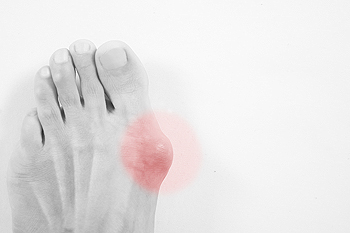 If you notice a bump on the side of your big toe, you may have what is referred to as a bunion. It may cause pain and discomfort, and it may be difficult to wear shoes that are typically worn on a weekly basis. Some of the symptoms that are generally associated with this condition can include calluses that form on top of the bunion, pain and swelling surrounding the affected area, and the skin may feel sore. Bunions have been known to be caused by wearing shoes that do not have ample room for the toes to move freely in. Additionally, there may be existing medical conditions such as gout or rheumatoid arthritis that can contribute to this condition. If you have developed a bunion, it is advised that you consult with a podiatrist who can offer you proper treatment options.
If you notice a bump on the side of your big toe, you may have what is referred to as a bunion. It may cause pain and discomfort, and it may be difficult to wear shoes that are typically worn on a weekly basis. Some of the symptoms that are generally associated with this condition can include calluses that form on top of the bunion, pain and swelling surrounding the affected area, and the skin may feel sore. Bunions have been known to be caused by wearing shoes that do not have ample room for the toes to move freely in. Additionally, there may be existing medical conditions such as gout or rheumatoid arthritis that can contribute to this condition. If you have developed a bunion, it is advised that you consult with a podiatrist who can offer you proper treatment options.
If you are suffering from bunions, contact Brent Harwood, DPM of Southeast Podiatry. Our doctor can provide the care you need to keep you pain-free and on your feet.
What Is a Bunion?
A bunion is formed of swollen tissue or an enlargement of boney growth, usually located at the base joint of the toe that connects to the foot. The swelling occurs due to the bones in the big toe shifting inward, which impacts the other toes of the foot. This causes the area around the base of the big toe to become inflamed and painful.
Why Do Bunions Form?
Genetics – Susceptibility to bunions are often hereditary
Stress on the feet – Poorly fitted and uncomfortable footwear that places stress on feet, such as heels, can worsen existing bunions
How Are Bunions Diagnosed?
Doctors often perform two tests – blood tests and x-rays – when trying to diagnose bunions, especially in the early stages of development. Blood tests help determine if the foot pain is being caused by something else, such as arthritis, while x-rays provide a clear picture of your bone structure to your doctor.
How Are Bunions Treated?
If you have any questions, please feel free to contact one of our offices located in Fairhope, Brewton, and Atmore, AL . We offer the newest diagnostic and treatment technologies for all your foot care needs.
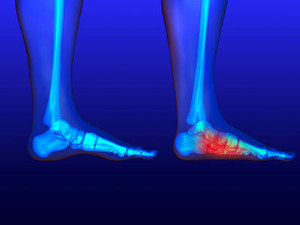 An effective way of checking to see if you have flat feet is to stand on the floor and notice if your entire foot touches the ground. Flat feet are generally not a cause for serious concern, despite the fact that there may be mild pain. Moderate relief may be found when custom made orthotics are worn, and this may help to provide the arch support that is needed for daily walking. Additionally, there may be specific foot stretches that can be frequently practiced which can be beneficial in strengthening the foot. Common causes for this condition can include genetic factors, insufficient foot growth, or medical conditions that may affect the foot muscles. If you have flat feet, it is suggested that you be under the care of a podiatrist who can help you with managing this condition.
An effective way of checking to see if you have flat feet is to stand on the floor and notice if your entire foot touches the ground. Flat feet are generally not a cause for serious concern, despite the fact that there may be mild pain. Moderate relief may be found when custom made orthotics are worn, and this may help to provide the arch support that is needed for daily walking. Additionally, there may be specific foot stretches that can be frequently practiced which can be beneficial in strengthening the foot. Common causes for this condition can include genetic factors, insufficient foot growth, or medical conditions that may affect the foot muscles. If you have flat feet, it is suggested that you be under the care of a podiatrist who can help you with managing this condition.
Flatfoot is a condition many people suffer from. If you have flat feet, contact Brent Harwood, DPM from Southeast Podiatry. Our doctor will treat your foot and ankle needs.
What Are Flat Feet?
Flatfoot is a condition in which the arch of the foot is depressed and the sole of the foot is almost completely in contact with the ground. About 20-30% of the population generally has flat feet because their arches never formed during growth.
Conditions & Problems:
Having flat feet makes it difficult to run or walk because of the stress placed on the ankles.
Alignment – The general alignment of your legs can be disrupted, because the ankles move inward which can cause major discomfort.
Knees – If you have complications with your knees, flat feet can be a contributor to arthritis in that area.
Symptoms
Treatment
If you are experiencing pain and stress on the foot you may weaken the posterior tibial tendon, which runs around the inside of the ankle.
If you have any questions please feel free to contact one of our offices located in Fairhope, Brewton, and Atmore, AL . We offer the newest diagnostic and treatment technologies for all your foot and ankle needs.
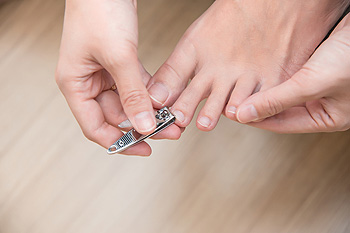 When the feet are cared for properly and on a regular basis, uncomfortable foot conditions may be prevented. There are routines that are easy to follow which can help assure the feet stay in optimum condition. These can include washing and drying the feet thoroughly, followed by using a good moisturizer. Additionally, when the toenails are trimmed, it is best to cut the nails straight across instead of at an angle. This may be helpful in preventing ingrown toenails from developing. Despite the fact that many people like to wear high heels, research has indicated it is beneficial to wear them for limited times, in addition to alternating them with shoes that have a lower heel. Athlete’s foot may be avoided when appropriate shoes are worn in public shower rooms, and surrounding areas. If you would like more information about how to properly care for your feet on an everyday basis, please consult with a podiatrist.
When the feet are cared for properly and on a regular basis, uncomfortable foot conditions may be prevented. There are routines that are easy to follow which can help assure the feet stay in optimum condition. These can include washing and drying the feet thoroughly, followed by using a good moisturizer. Additionally, when the toenails are trimmed, it is best to cut the nails straight across instead of at an angle. This may be helpful in preventing ingrown toenails from developing. Despite the fact that many people like to wear high heels, research has indicated it is beneficial to wear them for limited times, in addition to alternating them with shoes that have a lower heel. Athlete’s foot may be avoided when appropriate shoes are worn in public shower rooms, and surrounding areas. If you would like more information about how to properly care for your feet on an everyday basis, please consult with a podiatrist.
Everyday foot care is very important to prevent infection and other foot ailments. If you need your feet checked, contact Brent Harwood, DPM from Southeast Podiatry. Our doctor can provide the care you need to keep you pain-free and on your feet.
Everyday Foot Care
Often, people take care of their bodies, face and hair more so than they do for their feet. But the feet are a very important aspect of our bodies, and one that we should pay more attention to. Without our feet, we would not be able to perform most daily tasks.
It is best to check your feet regularly to make sure there are no new bruises or cuts that you may not have noticed before. For dry feet, moisturizer can easily be a remedy and can be applied as often as necessary to the affected areas. Wearing shoes that fit well can also help you maintain good foot health, as well as making it easier to walk and do daily activities without the stress or pain of ill-fitting shoes, high heels, or even flip flops. Wearing clean socks with closed shoes is important to ensure that sweat and bacteria do not accumulate within the shoe. Clean socks help to prevent Athlete’s foot, fungi problems, bad odors, and can absorb sweat.
If you have any questions please feel free to contact one of our offices located in Fairhope, Brewton, and Atmore, AL . We offer the newest diagnostic and treatment technologies for all your foot care needs.
Read more about Everyday Foot Care Teenagers and children who actively participate in running and jumping sporting activities may be familiar with Sever’s disease. This condition affects the growth plate in the heel, and it occurs as a result of the bones, muscles, and tendons growing at different rates. The symptoms that are typically associated with this condition can consist of walking on tiptoes, pain when the heel is squeezed, and it may be difficult to walk upon arising in the morning. Moderate relief may be felt when the affected foot is elevated, and it may help to wear shoe inserts which can provide additional support. If your child has developed Sever’s disease, it is advised that you consult with a podiatrist who can guide your child toward proper treatment.
Teenagers and children who actively participate in running and jumping sporting activities may be familiar with Sever’s disease. This condition affects the growth plate in the heel, and it occurs as a result of the bones, muscles, and tendons growing at different rates. The symptoms that are typically associated with this condition can consist of walking on tiptoes, pain when the heel is squeezed, and it may be difficult to walk upon arising in the morning. Moderate relief may be felt when the affected foot is elevated, and it may help to wear shoe inserts which can provide additional support. If your child has developed Sever’s disease, it is advised that you consult with a podiatrist who can guide your child toward proper treatment.
Sever's disease often occurs in children and teens. If your child is experiencing foot or pain, see Brent Harwood, DPM from Southeast Podiatry. Our doctor can treat your child’s foot care needs.
Sever’s Disease
Sever’s disease is also known as calcaneal apophysitis, which is a medical condition that causes heel pain I none or both feet. The disease is known to affect children between the ages of 8 and 14.
Sever’s disease occurs when part of the child’s heel known as the growth plate (calcaneal epiphysis) is attached to the Achilles tendon. This area can suffer injury when the muscles and tendons of the growing foot do not keep pace with bone growth. Therefore, the constant pain which one experiences at the back of the heel will make the child unable to put any weight on the heel. The child is then forced to walk on their toes.
Symptoms
Acute pain – Pain associated with Sever’s disease is usually felt in the heel when the child engages in physical activity such as walking, jumping and or running.
Highly active – Children who are very active are among the most susceptible in experiencing Sever’s disease, because of the stress and tension placed on their feet.
If you have any questions, please feel free to contact one of our offices located in Fairhope, Brewton, and Atmore, AL . We offer the newest diagnostic and treatment technologies for all your foot and injuries.
Read more about Sever's Disease A bony protrusion on the bottom of the big toe may be indicative of a bunion. It develops as a result of wearing shoes that do not have enough room for the toes to move freely in, or it may come from certain genetic factors. They can cause severe pain and discomfort, and in certain cases, surgery may be necessary for permanent relief. Patients may be eligible for surgery if there is consistent pain while performing daily activities, or if you are unable to straighten or bend your big toe. There are specific types of bunion surgery. An osteotomy consists of cutting the joint in the big toe, and aligning it to it’s normal placement. An exostectomy is performed when the bunion is removed from the joint, and an alignment is not necessary. If metal plates are needed to correct the deformity, an arthrodesis may be performed. If you have a bunion, please consult with a podiatrist who can help you to determine if bunion surgery is correct for you.
A bony protrusion on the bottom of the big toe may be indicative of a bunion. It develops as a result of wearing shoes that do not have enough room for the toes to move freely in, or it may come from certain genetic factors. They can cause severe pain and discomfort, and in certain cases, surgery may be necessary for permanent relief. Patients may be eligible for surgery if there is consistent pain while performing daily activities, or if you are unable to straighten or bend your big toe. There are specific types of bunion surgery. An osteotomy consists of cutting the joint in the big toe, and aligning it to it’s normal placement. An exostectomy is performed when the bunion is removed from the joint, and an alignment is not necessary. If metal plates are needed to correct the deformity, an arthrodesis may be performed. If you have a bunion, please consult with a podiatrist who can help you to determine if bunion surgery is correct for you.
Foot surgery is sometimes necessary to treat a foot ailment. To learn more, contact Brent Harwood, DPM of Southeast Podiatry. Our doctor will assist you with all of your foot and ankle needs.
When Is Surgery Necessary?
Foot and ankle surgery is generally reserved for cases in which less invasive, conservative procedures have failed to alleviate the problem. Some of the cases in which surgery may be necessary include:
What Types of Surgery Are There?
The type of surgery you receive will depend on the nature of the problem you have. Some of the possible surgeries include:
Benefits of Surgery
Although surgery is usually a last resort, it can provide more complete pain relief compared to non-surgical methods and may allow you to finally resume full activity.
Surgical techniques have also become increasingly sophisticated. Techniques like endoscopic surgery allow for smaller incisions and faster recovery times.
If you have any questions please feel free to contact one of our offices located in Fairhope, Brewton, and Atmore, AL . We offer the newest diagnostic and treatment technologies for all your foot and ankle needs.
 Dry skin will generally precede the condition that is known as cracked heels. This ailment affects the outer edges of the heels and can cause severe pain and discomfort. Common reasons for cracked heels to develop can include standing for extended periods of time throughout the day, wearing shoes that have an open back, or medical conditions such as eczema or psoriasis. Research has indicated that it may be beneficial to sanitize a bowl and soak your feet in warm water. This, followed by using a good moisturizer, can be useful in locking in the moisture that soaking the feet provided. If you are severely affected by cracked heels, it is suggested that you consult with a podiatrist who can offer you treatment options and discuss preventative methods.
Dry skin will generally precede the condition that is known as cracked heels. This ailment affects the outer edges of the heels and can cause severe pain and discomfort. Common reasons for cracked heels to develop can include standing for extended periods of time throughout the day, wearing shoes that have an open back, or medical conditions such as eczema or psoriasis. Research has indicated that it may be beneficial to sanitize a bowl and soak your feet in warm water. This, followed by using a good moisturizer, can be useful in locking in the moisture that soaking the feet provided. If you are severely affected by cracked heels, it is suggested that you consult with a podiatrist who can offer you treatment options and discuss preventative methods.
Cracked heels are unsightly and can cause further damage to your shoes and feet. If you have any concerns, contact Brent Harwood, DPM from Southeast Podiatry. Our doctor can provide the care you need to keep you pain-free and on your feet.
Cracked Heels
Cracked heels appear unappealing and can make it harder for you walk around in sandals. Aside from looking unpleasant, cracked heels can also tear stockings, socks, and wear out your shoes. There are several methods to help restore a cracked heel and prevent further damage.
How Do You Get Them?
Dry skin is the number one culprit in creating cracked heels. Many athletes, walkers, joggers, and even swimmers suffer from cracked heels. Age and skin oil production play a role to getting cracked heels as well.
Promote Healing
Over the counter medicines can help, especially for those that need instant relief or who suffer from chronic dry feet.
Wear Socks – Wearing socks with medicated creams helps lock in moisture.
Moisturizers – Applying both day and night will help alleviate dryness which causes cracking.
Pumice Stones – These exfoliate and remove dead skin, which allows for smoother moisturizer application and better absorption into the skin.
Change in Diet
Eating healthy with a well-balanced diet will give the skin a fresh and radiant look. Your body responds to the kinds of food you ingest. Omega-3 fatty acids and zinc supplements can also revitalize skin tissue.
Most importantly, seek professional help if unsure how to proceed in treating cracked heels. A podiatrist will help you with any questions or information needed.
If you have any questions, please feel free to contact one of our offices located in Fairhope, Brewton, and Atmore, AL . We offer the newest diagnostic and treatment technologies for all your foot care needs.
Read more about Solutions for Cracked Heels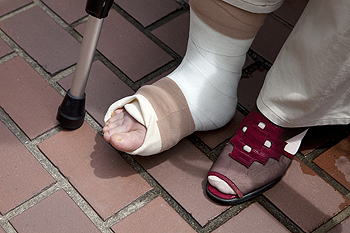 A common cause of a broken foot is a traumatic fall. Additionally, it can happen gradually from repeated stress that occurs in the same area of the foot. This can develop from frequently participating in sporting activities that involve running and jumping. The symptoms that many patients experience include severe pain and discomfort, an inability to walk, and the foot may become swollen or bruised. After a proper diagnosis is performed, which typically consists of having an X-ray taken, treatment can begin. The type of treatment may depend on the severity of the fracture. Effective methods can consist of wearing a boot or cast. If your foot is severely fractured, surgery may be necessary to repair the affected bones. If you have broken your foot, please consult with a podiatrist as quickly as possible to begin treatment.
A common cause of a broken foot is a traumatic fall. Additionally, it can happen gradually from repeated stress that occurs in the same area of the foot. This can develop from frequently participating in sporting activities that involve running and jumping. The symptoms that many patients experience include severe pain and discomfort, an inability to walk, and the foot may become swollen or bruised. After a proper diagnosis is performed, which typically consists of having an X-ray taken, treatment can begin. The type of treatment may depend on the severity of the fracture. Effective methods can consist of wearing a boot or cast. If your foot is severely fractured, surgery may be necessary to repair the affected bones. If you have broken your foot, please consult with a podiatrist as quickly as possible to begin treatment.
A broken foot requires immediate medical attention and treatment. If you need your feet checked, contact Brent Harwood, DPM from Southeast Podiatry. Our doctor can provide the care you need to keep you pain-free and on your feet.
Broken Foot Causes, Symptoms, and Treatment
A broken foot is caused by one of the bones in the foot typically breaking when bended, crushed, or stretched beyond its natural capabilities. Usually the location of the fracture indicates how the break occurred, whether it was through an object, fall, or any other type of injury.
Common Symptoms of Broken Feet:
Those that suspect they have a broken foot shoot seek urgent medical attention where a medical professional could diagnose the severity.
Treatment for broken bones varies depending on the cause, severity and location. Some will require the use of splints, casts or crutches while others could even involve surgery to repair the broken bones. Personal care includes the use of ice and keeping the foot stabilized and elevated.
If you have any questions please feel free to contact one of our offices located in Fairhope, Brewton, and Atmore, AL . We offer the newest diagnostic and treatment technologies for all your foot care needs.
Read more about Causes, Symptoms, and Treatment for a Broken Foot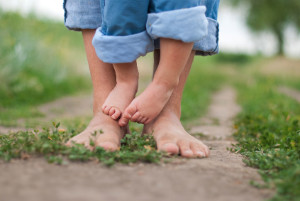 Research has indicated that the majority of babies are born with flat feet. This is a result of an undeveloped arch in the foot, and is noticeable when the entire foot lies flat on the floor. In many children, the arch is not fully formed until the teenage years. There are a number of reasons that can affect if the arch has or has not developed as the aging process occurs. These can include genetic factors as well as obesity. Some of the symptoms that are associated with flat feet can consist of severe pain, achiness, and swollen . If your child is experiencing pain while walking, it is suggested that you have a podiatrist examine their feet. Additionally, podiatrists can guide you toward choosing the correct insoles, and can recommend proper stretching techniques.
Research has indicated that the majority of babies are born with flat feet. This is a result of an undeveloped arch in the foot, and is noticeable when the entire foot lies flat on the floor. In many children, the arch is not fully formed until the teenage years. There are a number of reasons that can affect if the arch has or has not developed as the aging process occurs. These can include genetic factors as well as obesity. Some of the symptoms that are associated with flat feet can consist of severe pain, achiness, and swollen . If your child is experiencing pain while walking, it is suggested that you have a podiatrist examine their feet. Additionally, podiatrists can guide you toward choosing the correct insoles, and can recommend proper stretching techniques.
Flatfoot is a condition many people suffer from. If you have flat feet, contact Brent Harwood, DPM from Southeast Podiatry. Our doctor will treat your foot care needs.
What Are Flat Feet?
Flatfoot is a condition in which the arch of the foot is depressed and the sole of the foot is almost completely in contact with the ground. About 20-30% of the population generally has flat feet because their arches never formed during growth.
Conditions & Problems:
Having flat feet makes it difficult to run or walk because of the stress placed on the .
Alignment – The general alignment of your legs can be disrupted, because the move inward which can cause major discomfort.
Knees – If you have complications with your knees, flat feet can be a contributor to arthritis in that area.
Symptoms
Treatment
If you are experiencing pain and stress on the foot you may weaken the posterior tibial tendon, which runs around the inside of the .
If you have any questions please feel free to contact one of our offices located in Fairhope, Brewton, and Atmore, AL . We offer the newest diagnostic and treatment technologies for all your foot care needs.
Read more about Flatfoot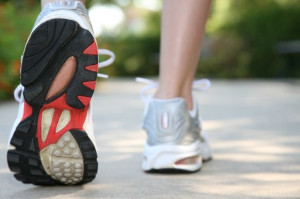 People who enjoy running are generally aware of the importance of choosing the right running shoe. These types of shoes fall into different categories based on running style. Additionally, for heavier runners, it is helpful to select shoes that have added stability. Research has indicated that determining how often running is practiced can help you to choose the correct shoe style. If your style of running includes exposure to mountains or trails, it may be beneficial to choose shoes that have additional traction. It is suggested that you consult with a podiatrist who can help you to determine which type of running shoe is best for you.
People who enjoy running are generally aware of the importance of choosing the right running shoe. These types of shoes fall into different categories based on running style. Additionally, for heavier runners, it is helpful to select shoes that have added stability. Research has indicated that determining how often running is practiced can help you to choose the correct shoe style. If your style of running includes exposure to mountains or trails, it may be beneficial to choose shoes that have additional traction. It is suggested that you consult with a podiatrist who can help you to determine which type of running shoe is best for you.
You should always make sure your running shoes fit properly in order to avoid injury. For more information, contact Brent Harwood, DPM from Southeast Podiatry. Our doctor can provide the care you need to keep you pain-free and on your feet.
Choosing the Right Running Shoe for Your Foot Type
Improper shoe sizing can cause a myriad of problems for your feet. Shoes that don’t fit you properly can lead to muscular imbalances in your body, which can result in foot, knee, and hip injuries.
Tips for Finding the Right Running Shoe
If you have any questions please feel free to contact our one of our offices located in Fairhope, Brewton, and Atmore, AL . We offer the newest diagnostic and treatment technologies for all your foot care needs.
Read more about Choosing the Right Running Shoe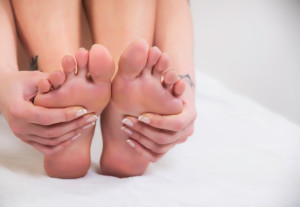 People who enjoy running are generally aware of the importance of having strong and stable feet. This can be accomplished by frequently performing stretching techniques that are designed to keep the feet flexible and strong. The feet are comprised of different types of muscles. Shorter muscles are known as intrinsic muscles, and are found inside the foot. They are responsible for moving the feet, and providing stability. A simple and effective movement known as toe curling can help to improve overall foot function. Additionally, the toes may become stronger when an effort is made to keep the big toe on the floor while lifting the other toes. Research has indicated the ankle will benefit when heel lifts are performed. If you would like more information about the importance of stretching the feet, or suggestions on specific foot stretches, please consult with a podiatrist.
People who enjoy running are generally aware of the importance of having strong and stable feet. This can be accomplished by frequently performing stretching techniques that are designed to keep the feet flexible and strong. The feet are comprised of different types of muscles. Shorter muscles are known as intrinsic muscles, and are found inside the foot. They are responsible for moving the feet, and providing stability. A simple and effective movement known as toe curling can help to improve overall foot function. Additionally, the toes may become stronger when an effort is made to keep the big toe on the floor while lifting the other toes. Research has indicated the ankle will benefit when heel lifts are performed. If you would like more information about the importance of stretching the feet, or suggestions on specific foot stretches, please consult with a podiatrist.
Why Stretching Is Important for Your Feet
Stretching the feet is a great way to prevent injuries. If you have any concerns with your feet consult with Brent Harwood, DPM from Southeast Podiatry. Our doctor will assess your condition and provide you with quality foot and ankle treatment.
Stretching the Feet
Stretching the muscles in the foot is an important part in any physical activity. Feet that are tight can lead to less flexibility and make you more prone to injury. One of the most common forms of foot pain, plantar fasciitis, can be stretched out to help ease the pain. Stretching can not only ease pain from plantar fasciitis but also prevent it as well. However, it is important to see a podiatrist first to determine if stretching is right for you. Podiatrists can also recommend other ways to stretch your feet. Once you know whether stretching is right for you, here are some excellent stretches you can do.
It is best to go easy when first stretching your foot and work your way up. If your foot starts hurting, stop exercising to ice and rest the foot. It is advised that you then see a podiatrist for help.
If you have any questions, please feel free to contact one of our offices located in Fairhope, Brewton, and Atmore, AL . We offer the newest diagnostic and treatment technologies for all your foot care needs.
 When a gout attack occurs, severe pain and discomfort often accompany this condition. It is considered to be a form of arthritis, and can occur as a result of genetic factors or from the foods that are eaten. Specific types of foods have elevated levels of purines. This may cause crystals to lodge in the joints of the big toe, and will typically cause redness and swelling. These foods can include shellfish, red meat, and drinks that are laden with sugar. There may be medications that can be taken to relieve some of the symptoms, despite the fact that there is no cure for gout. There are methods that can be implemented, which can possibly prevent painful gout attacks from occurring. These can consist of engaging in a frequent exercise program, and maintaining healthy eating habits, including drinking plenty of water daily. If you have developed gout, it is strongly suggested that you speak to a podiatrist as quickly as possible to obtain relief.
When a gout attack occurs, severe pain and discomfort often accompany this condition. It is considered to be a form of arthritis, and can occur as a result of genetic factors or from the foods that are eaten. Specific types of foods have elevated levels of purines. This may cause crystals to lodge in the joints of the big toe, and will typically cause redness and swelling. These foods can include shellfish, red meat, and drinks that are laden with sugar. There may be medications that can be taken to relieve some of the symptoms, despite the fact that there is no cure for gout. There are methods that can be implemented, which can possibly prevent painful gout attacks from occurring. These can consist of engaging in a frequent exercise program, and maintaining healthy eating habits, including drinking plenty of water daily. If you have developed gout, it is strongly suggested that you speak to a podiatrist as quickly as possible to obtain relief.
Gout is a painful condition that can be treated. If you are seeking treatment, contact Brent Harwood, DPM from Southeast Podiatry. Our doctor will treat your foot care needs.
What Is Gout?
Gout is a form of arthritis that is characterized by sudden, severe attacks of pain, redness, and tenderness in the joints. The condition usually affects the joint at the base of the big toe. A gout attack can occur at any random time, such as the middle of the night while you are asleep.
Symptoms
Risk Factors
Prior to visiting your podiatrist to receive treatment for gout, there are a few things you should do beforehand. If you have gout you should write down your symptoms--including when they started and how often you experience them, important medical information you may have, and any questions you may have. Writing down these three things will help your podiatrist in assessing your specific situation so that he or she may provide the best route of treatment for you.
If you have any questions, please feel free to contact one of our offices located in Fairhope, Brewton, and Atmore, AL . We offer the newest diagnostic and treatment technologies for all your foot care needs.
Read more about Gout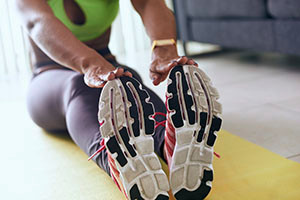 Many people have a strong desire to run in a marathon. Research has indicated the importance of warming up properly as the training regime begins, and this may be helpful in preventing running injuries. An injury to the plantar fascia typically starts by noticing pain in the heel. It is recommended that the calves and arches are properly stretched before beginning the physical training that is necessary to run a marathon. This can help to keep the muscles and tendons flexible. injuries may be avoided by performing heel drops, which can help to build strength in the . Additionally, it is helpful to wear running shoes that are made of a lightweight material, and have adequate cushioning. If you enjoy the sport of running, and would like additional information about how the feet may be affected by running injuries, please consult with a podiatrist.
Many people have a strong desire to run in a marathon. Research has indicated the importance of warming up properly as the training regime begins, and this may be helpful in preventing running injuries. An injury to the plantar fascia typically starts by noticing pain in the heel. It is recommended that the calves and arches are properly stretched before beginning the physical training that is necessary to run a marathon. This can help to keep the muscles and tendons flexible. injuries may be avoided by performing heel drops, which can help to build strength in the . Additionally, it is helpful to wear running shoes that are made of a lightweight material, and have adequate cushioning. If you enjoy the sport of running, and would like additional information about how the feet may be affected by running injuries, please consult with a podiatrist.
All runners should take extra precaution when trying to avoid injury. If you have any concerns about your feet, contact Brent Harwood, DPM of Southeast Podiatry. Our doctor will treat your foot care needs.
How to Prevent Running Injuries
There are a lot of mistakes a runner can make prior to a workout that can induce injury. A lot of athletes tend to overstretch before running, instead of saving those workouts for a post-run routine. Deep lunges and hand-to-toe hamstring pulls should be performed after a workout instead of during a warmup. Another common mistake is jumping into an intense routine before your body is physically prepared for it. You should try to ease your way into long-distance running instead of forcing yourself to rush into it.
More Tips for Preventing Injury
If you have any questions, please feel free to contact one of our offices located in Fairhope, Brewton, and Atmore, AL . We offer the newest diagnostic and treatment technologies for all your foot care needs.
Read more about Preventing Running Injuries